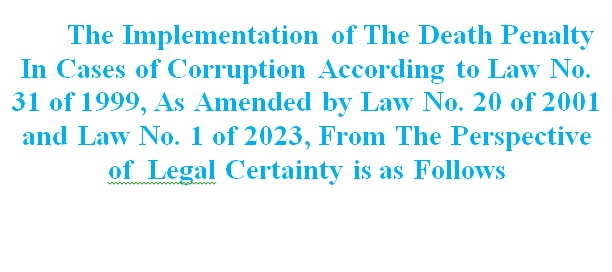The Implementation of The Death Penalty In Cases of Corruption According to Law No. 31 of 1999, as Amended by Law No. 20 of 2001 and Law No. 1 of 2023, From The Perspective of Legal Certainty is as Follows
DOI:
https://doi.org/10.8888/ijospl.v4i1.125Keywords:
death penalty, corruption crimes, legal certaintyAbstract
Criminal law regulates prohibited acts under the law and the criminal sanctions for perpetrators. Punishment is the suffering imposed by the state on criminal offenders. Corruption is an act that violates the law and involves the subordination of personal interests above public interests, including violations of norms, duties, and public welfare. Corruption is carried out through secrecy, betrayal, fraud, and manipulation that harm the people. The death penalty is considered the most severe punishment under Law No. 1 of 2023. The Criminal Code (KUHP) explicitly regulates the death penalty as the principal punishment. However, the implementation of the death penalty for corruption in Indonesia is still not optimal due to factors such as the lack of clarity and accuracy in the law enforcement system, as well as judges' assessment of justice and legal certainty for corruptors. Other obstacles also affect the implementation of the death penalty. Law No. 1 of 2023 states that the death penalty can be applied if the corruption perpetrator shows no remorse and good behavior during a 10-year probation period. If the corruption perpetrator demonstrates good behavior and receives clemency, the death penalty will not be carried out, even if the elements of Law No. 31 of 1999 on Corruption Eradication (UU Tipikor) Article 2 paragraphs 1 and 2 are fulfilled. Until now, no corruptor in Indonesia has been sentenced to death in various corruption cases. Furthermore, the punishment for corruptors under the Criminal Code is lower than under the Law on Eradication of Corruption Crimes (UU Tipikor). Article 2 of UU Tipikor establishes a minimum imprisonment of four years and a maximum of 20 years for corruptors. UU Tipikor also regulates a minimum fine of IDR 200 million and a maximum of IDR 1 billion for corruptors. The high number of corruption cases receiving lenient sentences and the absence of corruptors in Indonesia being sentenced to death indicate the need for a study of UU Tipikor Article 2 paragraphs 1 and 2. This aims to ensure that the application of the death penalty in corruption verdicts fulfills legal certainty without confusion in law enforcement. Although the death penalty is considered a last resort by law enforcement authorities in corruption cases, judges' assessment must also consider the aspects of crimes that harm the state and society, including corruption crimes committed in specific circumstances such as disasters. Article 2 paragraph (2) states that in cases of corruption committed in specific circumstances, the death penalty can be imposed to meet the elements of judges' assessment and consideration in imposing the death penalty verdict.
Downloads
References
Ali, M. (2022). Basics of Criminal Law. Sinar Grafika.
Anjari, W. (2020). Application of Capital Punishment to Convicted Corruption Cases. Masalah-Masalah Hukum, 49(4), 432–442. https://doi.org/10.14710/mmh.49.4.2020.432-442
Anjari, W. (2023). Application Of Aggravation Of Punishment. 15(2), 263–281. https://doi.org/10.29123/jy.v15i2.507
Christianto, H. (2017). Crimes of Morality, Extensive Interpretation, and Case Study. Suluh Media, 1.
Erni, & Achmad, R. (2017). Criminal Law Policy on Remission for Perpetrators of Corruption Crimes in Indonesian Legislation. Legalitas, 9(1), 80–112. http://legalitas.unbari.ac.id/index.php/Legalitas/article/view/143
Hadiyanto, A. (2016). Pros and Cons of Capital Punishment in Indonesia. Jurnal Dimensi, 5(2), 1–20. https://doi.org/10.33373/dms.v5i2.3
Kristina Dwi Putri, A. (2021). Effectiveness of Imposing the Death Penalty on Perpetrators of Corruption Crimes in Indonesia. E-Journal Komunitas Yustisia, 4(November), 736–747.
Muzakkir, Rani, F. A., & Ali, D. (2014). Capital Punishment from the Perspective of the Indonesian Judiciary. Jurnal Ilmu Hukum, 2(2), 67–76.
Remaja, N. G. (2014). The Meaning of Law and Legal Certainty. Kertha Widya: Jurnal Hukum, 2(1), 1–26. https://ejournal.unipas.ac.id/index.php/KW/article/view/426/351
Satriyo Kusumo, A. T. (2015). The Death Penalty from the Perspective of International Law and Human Rights. Koleksi Pusat Dokumentasi ELSAM, 3. http://id.wikipedia.org/wiki/hukuman_mati
Sinaga, J. (2017). Law Enforcement Policy in Corruption Crimes Based on Non-Penal Approaches. Jurnal Law Pro Justitia Vol. II, No. 2 – June 2017, II(2), 11–40.
Sukinto, I.Y.W., & SH, M. (2022). Smuggling Crimes in Indonesia: Formulating Criminal Sanctions Policy. Sinar Grafika.
Yuhermansyah, E. (2017). Edi Yuhermansyah & Zaziratul Fariza: Capital Punishment... Page | 156. VI(1), 156–174.

Downloads
Published
How to Cite
Issue
Section
License
Copyright (c) 2023 INTERNATIONAL JOURNAL OF SOCIAL, POLICY AND LAW

This work is licensed under a Creative Commons Attribution-NonCommercial 4.0 International License.








